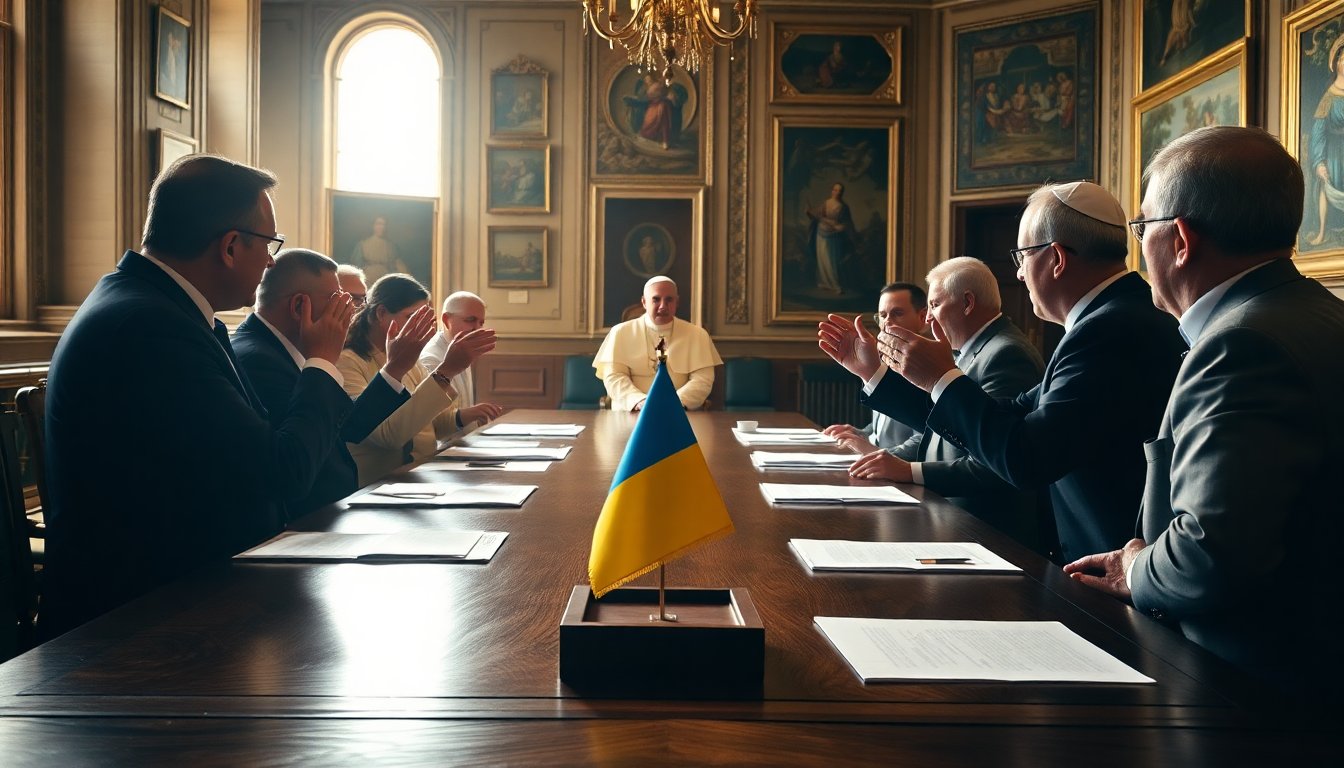Table of Contents
In a significant diplomatic engagement, a delegation from Ukraine has met with Pope Leo to discuss the plight of children currently held in Russia. This meeting is not merely a formality but a strategic move to gain the Vatican’s influence in securing these children’s release. As the conflict between Ukraine and Russia continues, the humanitarian crisis intensifies, prompting calls for intervention from various global leaders, including the Pope.
The discussions come at a crucial time when Ukraine is grappling with both military and humanitarian challenges. The delegation hopes to capitalize on the Pope’s vocal advocacy for peace to encourage the Vatican to take a more active role in mediating this complex situation.
US peace plan pressures Ukraine
Compounding the challenges faced by Ukraine is a recently unveiled 28-point peace plan proposed by the United States. This plan emerged from confidential negotiations and has been presented to Ukrainian President Volodymyr Zelenskyy. The timing of this proposal places immense pressure on Zelenskyy to either accept the framework or risk facing dire consequences. However, the Ukrainian leader has firmly stated that he will not compromise his nation’s interests.
Trump’s deadline and its implications
During a recent interview, former U.S. President Donald Trump indicated that a deadline of next Thursday has been set for Ukraine to agree to the peace plan. He described this timeline as an appropriate period for Ukraine to assess the proposal. Trump’s comments reflect the urgency felt by U.S. officials, who desire Ukraine’s agreement by November 27. Yet, Zelenskyy has emphasized the need to maintain Ukraine’s sovereignty and dignity throughout this process, indicating that any agreement must not undermine these core principles.
Humanitarian concerns amid conflict
The ongoing war has wreaked havoc on countless lives in Ukraine. For instance, a recent Russian missile strike on an apartment complex in the city of Ternopil resulted in the tragic deaths of 31 individuals, including six children. In response to such tragedies, candlelight vigils have emerged across various Ukrainian cities, where citizens gather to mourn and demonstrate solidarity. These gatherings serve as a poignant reminder of the human cost of the conflict.
Balancing dignity with diplomacy
Zelenskyy has articulated the profound dilemma facing Ukraine: to either risk losing a critical international ally or sacrifice national dignity. In a heartfelt video message, he expressed the heavy burden of making such a choice, highlighting that Ukraine’s struggle is not merely for survival, but for maintaining its sovereignty and independence in the face of aggression.
He underscored the importance of working collaboratively with U.S. officials to navigate this precarious situation. Despite the tension surrounding the peace negotiations, Zelenskyy remains committed to ensuring that Ukraine’s voice is heard and respected in any discussions regarding its future.
European support and the path forward
Meanwhile, European leaders have been actively engaging with Zelenskyy on the sidelines of the G20 summit in Johannesburg. The collaborative dialogue among leaders such as Keir Starmer, Emmanuel Macron, and Friedrich Merz emphasizes a unified European stance on supporting Ukraine’s right to self-determination. As they discuss the U.S. peace plan, the overarching consensus remains that any decisions affecting Ukraine must ultimately be in its hands.
As Ukraine commemorates its Day of Dignity and Freedom, marking significant pro-democracy movements in its history, Zelenskyy’s reflections on the past serve as a rallying cry for the present. He poignantly remarked on the sacrifices made for Ukraine’s independence, reiterating that defending its dignity is a formidable challenge, especially when facing a neighboring aggressor like Russia.
In conclusion, the intersection of humanitarian concerns, international diplomacy, and national integrity paints a complex picture for Ukraine. The upcoming days are critical as Zelenskyy navigates the delicate balance between accepting international proposals and safeguarding Ukraine’s sovereignty. The hope is that through continued dialogue and support, a peaceful resolution that respects the rights and dignity of the Ukrainian people can be achieved.


